For documentary filmmaker Dawn Porter, her latest effort, “John Lewis: Good Trouble,” wasn't work as much as it was a labor of love.
Porter spent months with Lewis and the resulting doc digs beyond his iconic status as statesman to paint a vivid, honest portrait of the man who spent 33 years as a U.S. representative for Georgia's 5th congressional district and almost six decades as a civil rights leader.
The 2020 documentary is peppered with interviews from Democratic figures both familiar and new — Stacey Abrams, Bill and Hillary Clinton, Alexandria Ocasio-Cortez, Nancy Pelosi, Cory Booker, and Ilhan Omar — all of whom praise and cite Lewis as an inspiration.
Porter spoke with NBCLX about her time spent with Lewis, the passions that drove him, his thoughts on then-President Trump, and revealed what even surprised her about "The Boy From Troy."
The following interview has been edited and condensed for clarity..
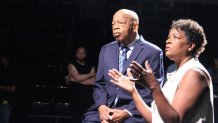
NBCLX: Why did you decide to choose John Lewis as the subject of your documentary?
Porter: One part of his life was so well known. But there was so much more to him as a person. And I was really interested to get behind the legend of John Lewis. And he agreed to hang out with me for a year and expose a personal side to his life. So that was just the gift of a lifetime. I leaped at the chance to ask him about his hopes and dreams and what inspired him to become the leader that inspires us.
NBCLX: What was your first meeting with him like?
Porter: We started working in 2018, just before the midterm elections when he was campaigning. But I had met the congressman several times before. He was in my first film, "Gideon's Army," about three public defenders working in the Deep South. And that was really when I have to actually say that I traced my real fascination with him as a person, back to that meeting, because he gave a speech to the young lawyers telling them about how important young people and lawyers had been to his life and his career. And he really touched them. And I just thought, I really want to know more about his life.
More From NBCLX
28 Days, 28 Films for Black History Month
Rev. Raphael Warnock and Jon Ossoff Owe Their Historic Georgia Senate Wins to John Lewis
NBCLX: So there was already a relationship in place before starting the doc?
Porter: I think when we approached him about doing this film, he felt like he kind of knew me a little bit. So we settled into a rhythm very quickly. The congressman was a very trusting and open person, and he really was always rooting for everybody.
NBCLX: And your time with him was a mix of in-person and telephone conversations?
Porter: No, all in person. Essentially, what we would do is arrange with his office and his staff. So I would say I really would like to go to his hometown of Troy, Alabama. And they would say he's going to be in Atlanta and he's probably going to go to Troy. And then I would show up and he would be there, and he was just delighted to see us. He was just a very, very welcoming person. He was almost 80 when we started filming.
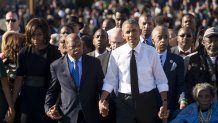
NBCLX: Being the iconic figure that he was, you must have had some preconceived notions about the sort of man he was going into this project. What did you learn about him that surprised you?
Porter: I knew he was a forceful speaker. I knew he was a powerful man in his quietness. I didn't know how funny he was. I didn't know his great sense of humor. It's hard to see unless you've spent some time with him, but Mr. Lewis lived his life with great joy. He was a satisfied person. And by satisfied, I mean he knew he was in the right place and doing work that he believed in with people he loved. And the other thing I learned about him was that John Lewis is the most optimistic person I've ever met. He really had no doubt that America could move past difficulties and be a better version of itself. And he just had an unwavering faith that that would happen.
NBCLX: There were quite a few public dustups involving Donald Trump during his presidency. Did he share with you any of his personal thoughts about Trump?
Porter: You know what he said? He said, "If you can't say something nice don't say anything." And what I wanted to do in this film was really focus on what could happen... what was possible... and not have Trump be too much of a presence in it.
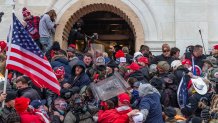
NBCLX: How do you believe he would have reacted to the riot at the Capitol?
Porter: I think that the insurrection and riot at the Capitol would have literally broken his heart. He had a great reverence for the body politic. One of the first things he did when the new 2018 congresspeople came into office was to meet with some of the newer members and talk to them about the importance of civility and the sanctity of our legislative body. So I think he would have been first disturbed and horrified, as we all were. But I know he would have been a leader in the effort to do justice for people who lost their lives, but also for America — to remind us that it's important that we hold people accountable and that something like the insurrection of January 6th never happens again. I was really, really missing his voice and his leadership in the days following the insurrection.
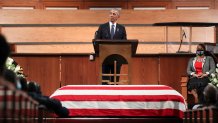
NBCLX: I imagine getting as close to him as you did during the making of the documentary, that his death hit you hard.
Porter: The thing when you make a film about somebody... if you think about our process of filmmaking... I watched everything I could about him. I memorized his speech patterns. I read everything I could about him. And then the footage that we shot, you know, as you're editing, you watch it over and over and over. So, Mr. Lewis, for that period of time, really inhabited, you know, my brain, my heart, my soul. So the idea that he was not physically here was really, really, really difficult. It was really, honestly, one of the harder things I've ever experienced.
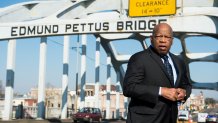
NBCLX: There's been a great deal of conversation about the renaming of the Edmund Pettus Bridge in his name given his historical ties to it. [During a 1965 protest march that became known as "Bloody Sunday," Lewis was brutally beaten by police on the bridge, which is named after a Ku Klux Klan leader.] What were his thoughts about that and what are your own personal thoughts about whether that would be the right thing to do?
Porter: He very much believed that local people should make that decision. One of the many remarkable things about him is that he did not seek grandiose attention. That's not why he did the work that he did. So I think he would support whatever the local people of Selma are inclined to do. I personally think it would be a great tribute to him. But I understand there are many leaders that should be recognized. I think the big thing is to get the Klan leader's name off of that bridge and to acknowledge the people who fought for equality.
"John Lewis: Good Trouble" is available on HBO Max, Amazon Prime and other streaming services.

